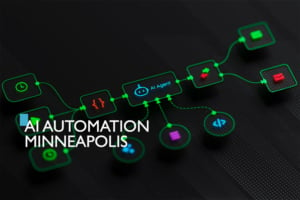AI Automation Minneapolis
Complete Business Guide
Years in Business
Completed Projects
AI automation Minneapolis businesses are increasingly adopting to gain competitive advantages in today’s technology-driven marketplace. With the state’s $31 billion tech sector contribution to the economy, companies across the Twin Cities are recognizing artificial intelligence as the next logical step in their digital transformation journey.
Understanding what is AI automation and developing a structured implementation roadmap can significantly impact your organization’s growth trajectory and operational efficiency.
Minneapolis businesses face unique opportunities in the current market landscape. The region’s strong technology infrastructure and skilled workforce create ideal conditions for successful AI automation Minneapolis deployments. However, without a clear strategy, companies risk costly mistakes and delayed returns on investment.

This technology encompasses machine learning algorithms, natural language processing, robotic process automation, and predictive analytics working together to optimize workflows. For Minnesota businesses, AI automation offers particular value in addressing regional challenges such as seasonal workforce fluctuations and supply chain complexities.
Manufacturing companies in the Twin Cities have reported 30% reductions in operational costs through intelligent inventory management systems. Financial services firms are using AI to process loan applications 60% faster while maintaining compliance with regulatory requirements.
The key to successful AI automation lies in identifying processes that are repetitive, rule-based, and data-intensive. These characteristics make them ideal candidates for automation while freeing employees to focus on strategic, creative, and relationship-building activities that drive business value.
A comprehensive AI implementation roadmap begins with thorough business assessment and goal definition. Organizations must evaluate their current technology infrastructure, data quality, and team capabilities before selecting appropriate AI solutions.
Research from Deloitte indicates that 73% of successful AI implementations start with pilot programs targeting specific business challenges rather than organization-wide deployments. The roadmap should include clear phases: discovery and planning, pilot program development, testing and validation, scaled deployment, and ongoing optimization.
Each phase requires specific timelines, resource allocation, and success metrics. Minnesota businesses benefit from focusing on use cases that align with regional market dynamics and customer expectations.
Stakeholder buy-in becomes critical during this phase, as AI implementation affects multiple departments and workflows. Minneapolis Web Design has observed that companies with strong change management processes achieve 40% higher adoption rates. Training programs and communication strategies must address employee concerns about job displacement while highlighting opportunities for skill development and career advancement.
Choosing the right AI technologies requires careful evaluation of business requirements, budget constraints, and integration capabilities. Cloud-based AI platforms like Microsoft Azure AI, AWS Machine Learning, and Google Cloud AI offer scalable solutions for businesses of all sizes.
According to Gartner, 80% of enterprises will integrate AI capabilities into their applications by 2026, making early adoption a competitive advantage. Integration planning must consider existing software systems, data sources, and security requirements.
Many Minnesota companies choose hybrid approaches that combine pre-built AI solutions with custom development to meet specific industry needs. Healthcare organizations, for example, require HIPAA-compliant AI solutions that protect patient data while improving diagnostic accuracy.
The technology selection process should include proof-of-concept testing to validate AI performance against real business data. This approach reduces implementation risks and provides concrete evidence of potential returns on investment. Minneapolis AI implementation projects benefit from local technology partnerships that understand regional business requirements and compliance considerations.

Training should cover both technical aspects of AI tools and strategic thinking about how artificial intelligence enhances human capabilities rather than replacing them. Deployment strategies vary based on organizational size and complexity.
Phased rollouts allow teams to learn from early implementations and refine processes before full-scale deployment. Minnesota businesses often start with customer service automation or data analysis applications that provide immediate value while building internal AI expertise.
Monitoring and support systems become essential during deployment phases. Effective branding strategies help communicate AI implementation benefits to customers and stakeholders. Regular performance reviews and feedback collection ensure AI systems continue meeting business objectives while identifying opportunities for optimization and expansion.
AI implementation success requires robust measurement frameworks that track both quantitative and qualitative outcomes. Key performance indicators should include process efficiency improvements, cost reductions, revenue increases, and customer satisfaction metrics.
Harvard Business Review research indicates that companies with comprehensive AI measurement strategies achieve 35% better returns on their technology investments. Continuous optimization becomes crucial as AI systems learn from new data and changing business conditions.
Machine learning models require regular retraining to maintain accuracy and relevance. Minnesota companies benefit from establishing dedicated AI governance teams that oversee performance monitoring, security compliance, and strategic alignment with business objectives.
The optimization phase also presents opportunities for expanding AI capabilities into new business areas. Search engine optimization and digital marketing automation represent natural extensions for businesses that have successfully implemented core AI operations.
Twin Cities business technology trends show increasing integration between AI automation and digital marketing strategies. Advanced analytics and business intelligence capabilities emerge as AI systems mature, providing deeper insights into customer behavior, market trends, and operational efficiency.
These capabilities position Minnesota businesses for sustained growth and competitive advantages in their respective markets. With proper planning and execution, AI implementation roadmap strategies deliver measurable results within 6-12 months while establishing foundations for long-term digital transformation success.
Most Minnesota businesses can expect a 3-6 month timeline for initial AI implementation, depending on complexity and existing infrastructure. Pilot programs typically launch within 4-8 weeks.
AI automation budgets vary significantly, with small to mid-sized businesses typically investing $3,500-$15,000 for initial implementations. ROI is often achieved within 12-18 months.
Common challenges include data quality issues, employee training requirements, integration with legacy systems, and ensuring compliance with industry regulations.
Popular AI automation tools include Microsoft Power Platform, Salesforce Einstein, HubSpot AI, and custom solutions built on OpenAI or Azure platforms, depending on specific business needs.
Key metrics include process efficiency improvements, cost reduction percentages, employee productivity gains, customer satisfaction scores, and time-to-value measurements.
Every moment your digital presence isn’t optimized, you’re leaving revenue and customer loyalty on the table. Strategic web experiences drive engagement.
In today’s market, brands that fail to tell a compelling story lose trust, traction, and market share. Effective marketing builds credibility.
Secure your no-obligation strategy session now—and walk away with a complimentary custom homepage design. Only 5 slots available each month!

 AI for Business Minneapolis: Separating Facts from Fiction for Smart Implem...
AI for Business Minneapolis: Separating Facts from Fiction for Smart Implem...